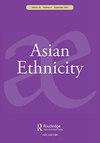Archipelagic Chineseness: competing ways of being Chinese Muslims in contemporary Indonesia and Malaysia
IF 0.8
Q3 ETHNIC STUDIES
引用次数: 1
Abstract
ABSTRACT Inspired by the concept of ‘archipelagic Islam’ and the recent academic call for archipelagic thinking, this article proposes the term ‘archipelagic Chineseness’ to analyze various discourses and practices of Chineseness that take into account diverse national and local contexts, without disregarding various transnational connections. However, different from the proponents of ‘archipelagic Islam’ who promote an ideal type of Islamic identity in Indonesia, I use ‘archipelagic Chineseness’ mainly not to prescribe a kind of ideal Chinese identity, but instead to explore and theorize multiple ways of being or not being Chinese in Indonesia, Malaysia, and beyond. The concept points to the possibility of being Chinese in a way that is neither totally subscribed to China’s growing influence, nor completely assimilated due to the demand of some nationalists. By examining the trends of Chinese-style mosques and Chinese Muslim preachers, I discuss how and under what conditions different Chinese and non-Chinese Muslims appropriate Chineseness for diverse reasons. While the Chinese-style mosques borrow the architectural design of ancient mosques in China, they adopt local cultural traditions and interact with local politics. Many Muslim leaders welcome such mosques as an initiative to promote localized Islam and to imagine a translocal Chinese Muslim identity. However, when it comes to preachers, there are contesting – if not conflicting – cultural and religious orientations, which are shaping and being shaped by the politics of race, religion and class in both countries. Thus, I propose ‘archipelagic Chineseness’ to analyze various entanglements of diverse transnational connections, national belongings and local sensibilities among ethnic Chinese in general and Chinese Muslims in particular. Archipelagic thinking around Chineseness also allows us to explore how ethnic Chinese in maritime Southeast Asia negotiate their Chineseness with their other identities, such as nationalities, localities, religion, and sexual identities.群岛华人性:当代印尼和马来西亚华人穆斯林的竞争方式
受“群岛式伊斯兰教”概念和最近学术界对群岛式思维的呼吁的启发,本文提出了“群岛式中国性”一词,以分析考虑到不同国家和地方背景的各种中国性话语和实践,同时不忽视各种跨国联系。然而,与“群岛式伊斯兰”的支持者在印尼提倡一种理想的伊斯兰身份认同不同,我使用“群岛式中国”主要不是为了规定一种理想的中国人身份认同,而是为了探索和理论在印尼、马来西亚和其他地方成为或不是中国人的多种方式。这一概念指出了以一种既不完全认同中国日益增长的影响力,也不完全被某些民族主义者所同化的方式成为中国人的可能性。通过考察中国式清真寺和中国穆斯林传教士的趋势,我讨论了不同的中国穆斯林和非中国穆斯林如何以及在什么条件下出于不同的原因适应中国性。中式清真寺在借鉴中国古代清真寺建筑设计的同时,也吸收了当地的文化传统,并与当地政治互动。许多穆斯林领导人对这样的清真寺表示欢迎,认为这是一种促进本土化的伊斯兰教的举措,也是一种跨地域的中国穆斯林身份的想象。然而,当涉及到传教士时,存在着相互冲突的——如果不是相互冲突的话——文化和宗教取向,这些取向正在塑造和被两国的种族、宗教和阶级政治所塑造。因此,我提出“群岛中国性”来分析中国人,特别是中国穆斯林之间的各种跨国联系、民族财产和地方情感的各种纠缠。围绕中国性的群岛思维也让我们能够探索东南亚沿海地区的华人如何与他们的其他身份(如国籍、地域、宗教和性别身份)协商他们的中国性。
本文章由计算机程序翻译,如有差异,请以英文原文为准。
求助全文
约1分钟内获得全文
求助全文
来源期刊

Asian Ethnicity
PHYSIOLOGY-
CiteScore
2.80
自引率
6.20%
发文量
27
期刊介绍:
In the twenty-first century ethnic issues have assumed importance in many parts of the world. Until recently, questions of Asian ethnicity and identity have been treated in a balkanized fashion, with anthropologists, economists, historians, political scientists, sociologists and others publishing their studies in single-discipline journals. Asian Ethnicity provides a cross-disciplinary, international venue for the publication of well-researched articles about ethnic groups and ethnic relations in the half of the world where questions of ethnicity now loom largest. Asian Ethnicity covers any time period, although the greatest focus is expected to be on the twentieth and twenty-first centuries.
 求助内容:
求助内容: 应助结果提醒方式:
应助结果提醒方式:


